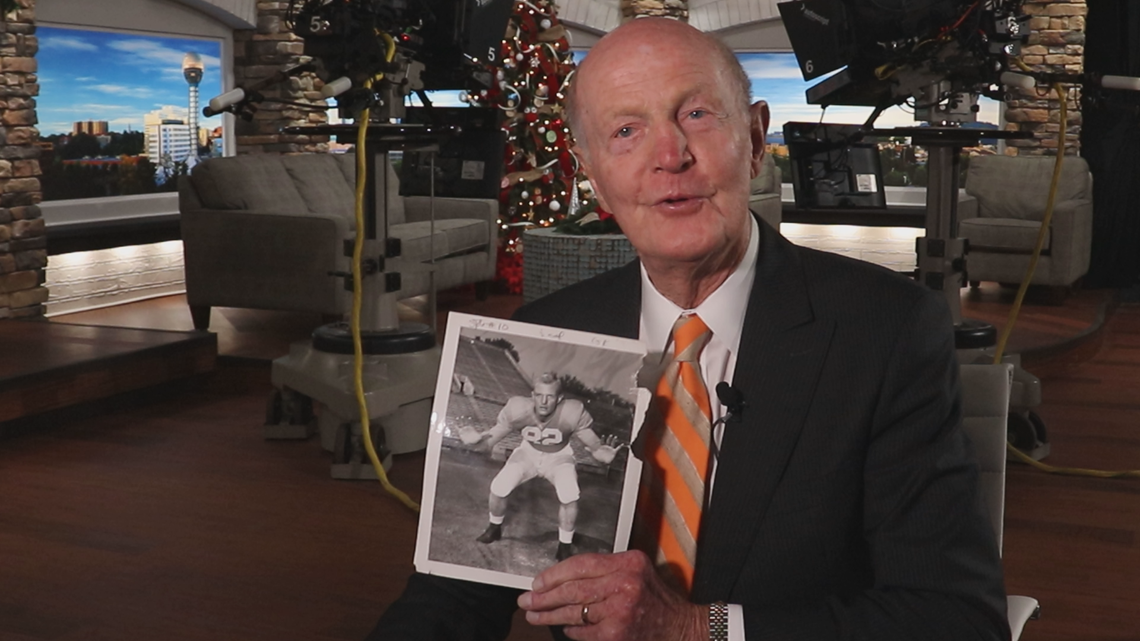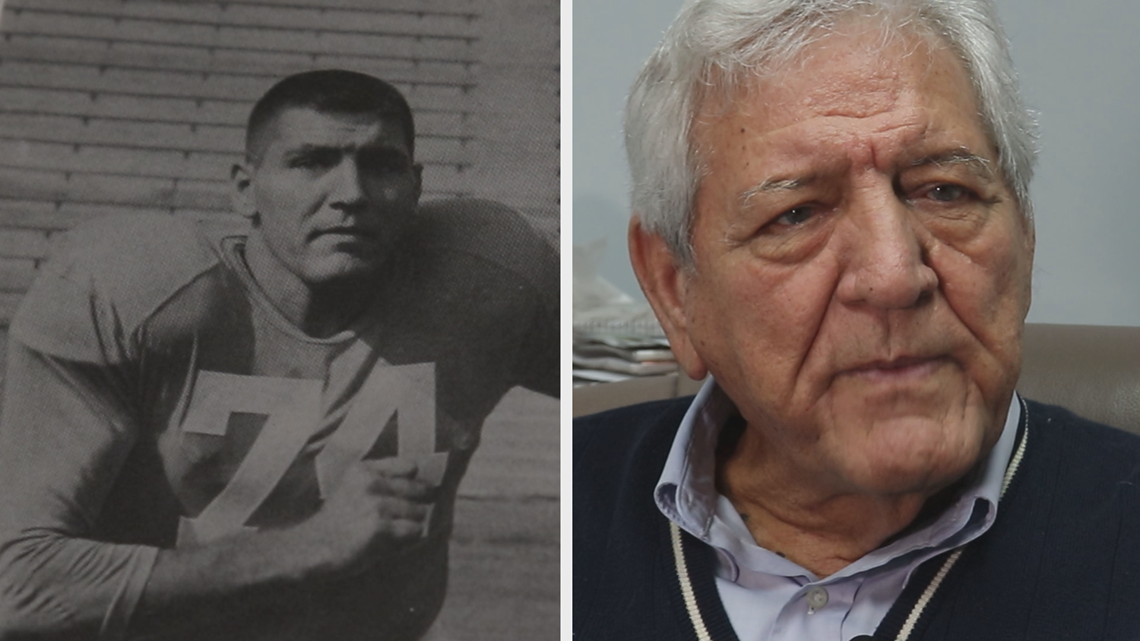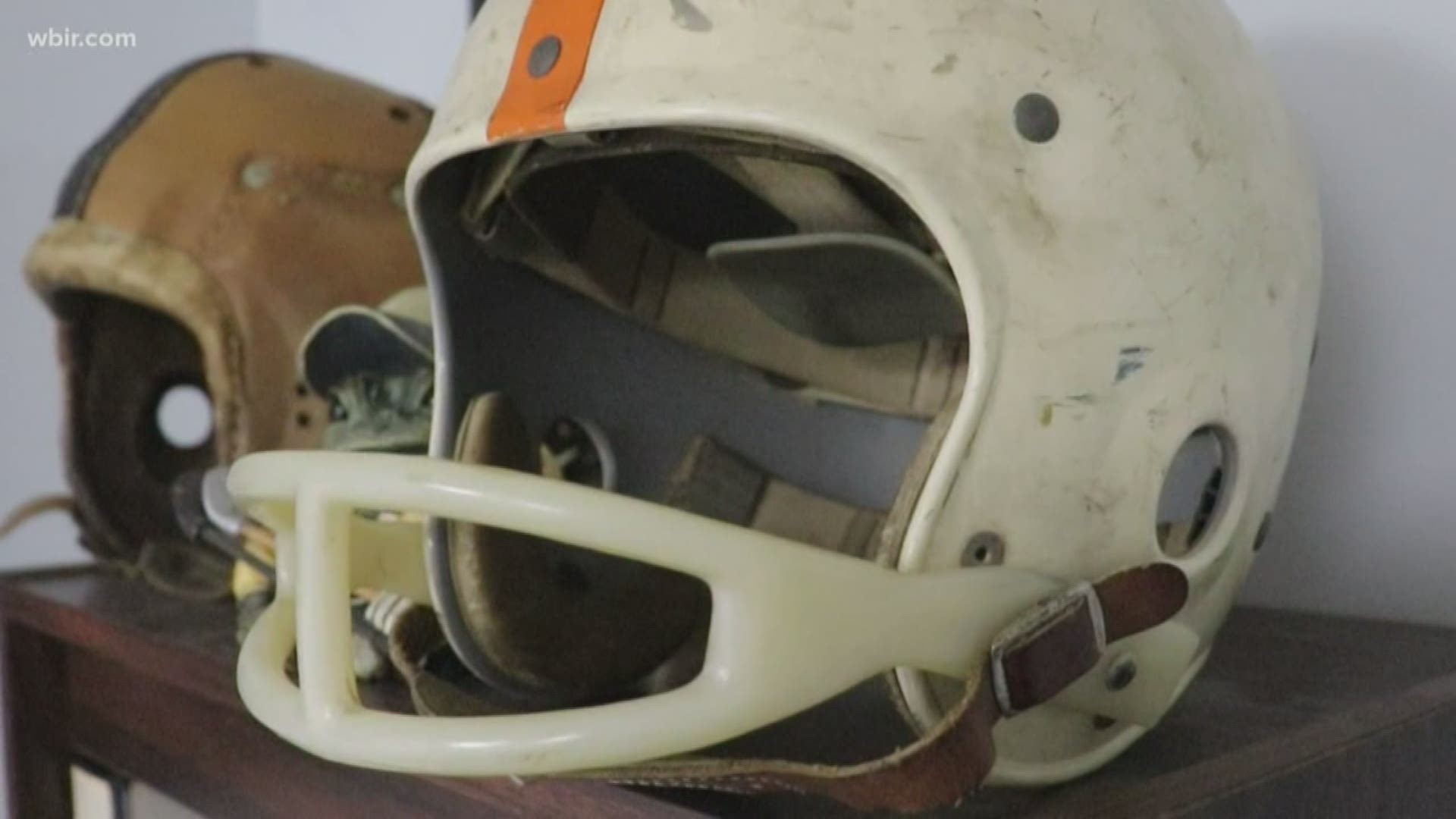JACKSONVILLE, Fla. — Inside Dr. Robert Overholt's copy of Big Orange: A Pictorial History of University of Tennessee Football, you'll find page after page of teams, players and moments that have stood the test of time. Awe-inspiring entries into the pantheon of college football. Overholt will be happy to tell you about every single one.
"Let's see if we can go back," Overholt mumbled as he flipped to a familiar time.
He rattles off names from teams past like they were his own family.
"Ralph Chancey, Skeeter Bailey, Bowden Wyatt."
He's having a pretty good time with the trip down memory lane.
"I haven't had this much fun in ages, just flipping through these pictures."
Overholt played for Tennessee in the mid 1950s.


"This is a well-trained 19-year-old athlete and here above him is a physician who looks back at the old days," Overholt joked.
He still keeps in touch with former teammates. Flipping through the book, Overholt listed more names.
"Jim Smelcher right here was left tackle, strong!"
Smelcher still lives in Knoxville. His Tennessee playing days are fresh in his mind. As a high school student, he decided early as to where he wanted to play.
"If they say come to Tennessee, I'm going to Tennessee," Smelcher said with a smile on his face.


Smelcher and Overholt were teammates in 1957. The season before, Tennessee finished 10-1, winning the SEC and finishing second in the AP Poll. In 1957, the path wasn't as easy. The Vols fell to Auburn in the first game of the season, then lost two straight in November to Ole Miss and Kentucky. But as the old saying goes, it's not how you start, it's how you finish, and the Vols had quite an opportunity ahead of them in Jacksonville, Florida - the team's first Gator Bowl appearance. The opponent - No. 9 Texas A&M.
"(In the) first place, this is not a normal game," Tennessee football historian and former sportswriter Tom Mattingly noted. He's absolutely right.


The Aggies had a lot going on for them that season, including the Heisman Trophy winner, John David Crow. The coach was none other than Paul "Bear" Bryant. The 1957 Gator Bowl was his last game at Texas A&M before leaving to coach the Alabama Crimson Tide, where he would win six national championships, three in the 1960s and three in the 1970s.
From the very beginning, it was clear this would be a defensive game. In the regular season, Texas A&M allowed only 4.7 points per game, while the Vols held opponents to 7.5 points per game. The two teams combined for seven shutouts prior to the Gator Bowl.
"A defensive struggle that has probably never been equaled in either team's history," Mattingly said.
"So we went into the game knowing it was going to be a tough game, but we had a gameplan and we were going to beat Texas A&M," Overholt said.
A then Gator Bowl record 43,709 people flooded the stands in Jacksonville, Florida in their Sunday Best to watch a game that was anything but angelic.
"Neither team really could gain an advantage with the rushing game and there wasn't that much passing because it was a monsoon type day with the weather," Mattingly said.
"The game went nip and tuck for the whole time," Smelcher added.
After three quarters, no one had scored.
"You knew sooner or later, something was going to happen," Mattingly said.
That something was Bobby Gordon. In the fourth quarter, the Tennessee tailback got the ball on the Texas A&M 19-yard line. His offensive line created a wide-open hole right through the gut of the defense. Gordon sprinted 10 yards untouched, but there to meet him on the 8-yard line was none other than the Heisman winner himself, John David Crow.
"Bobby thought he was going to run over Crow," Smelcher laughed. "Crow hit him and it knocked Crow out."
"They just collided with this ferocious noise," Overholt said.
Gordan, in a rather gruesome display, stumbled and swayed on his way back to the huddle after the hit, eventually falling to his knees. However the tailback stayed in the game, carried the ball three more times, putting Tennessee at fourth and goal from the 1-yard line. For the first time all season, Tennessee turned to Sammy Burklow.
"Sammy Burklow came in and kicked his only field goal of the '57 season, his only field goal while he was at Tennessee and the final score was 3-0. Some people consider that boring, but us historians of Tennessee football thought it was a classic," Mattingly laughed.
Overholt's career was cut short due to knee injuries. Smelcher was a senior that year. Tennessee's first Gator Bowl was his final game in Orange and White.
"We didn't win every game, so we weren't the best team Tennessee has ever had, but we had a good time," Overholt said with a smile.
The Vols finished the season 8-3. There was no SEC championship, no first place in the AP Poll, but the 1957 Gator Bowl will always have its place in history and in the hearts of the players on the field.
"The friendships that you make while you're there, I mean, it's four years of your life and just like that, that four years will be gone, you'll wonder what happened? Where did it go?" Smelcher said.
"My experience at UT, I wouldn't trade it for anything."

